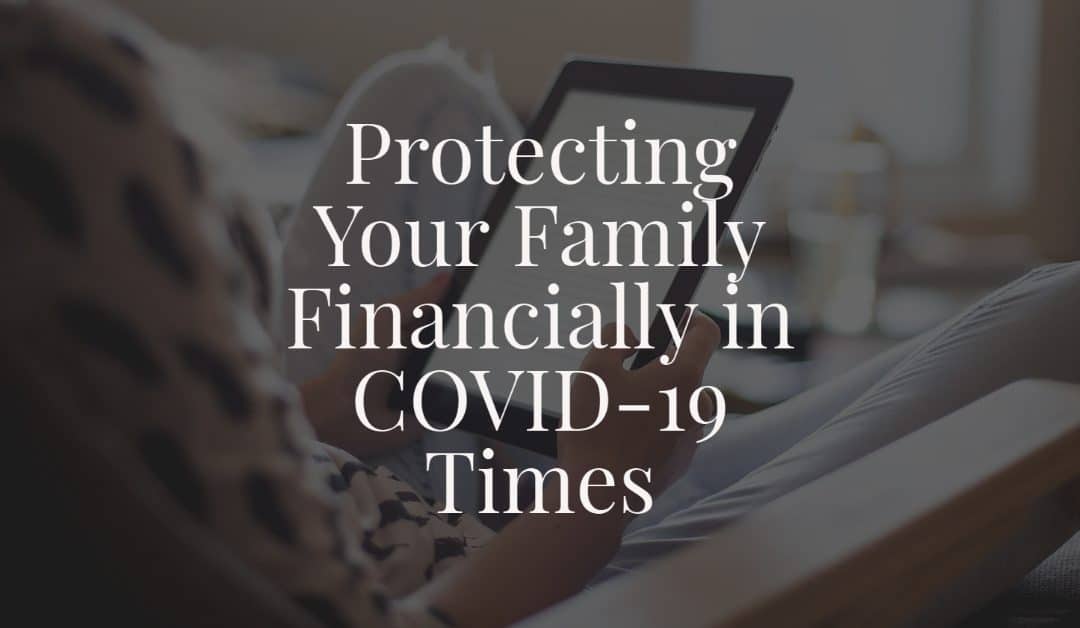In these COVID-19 times, it has become shockingly clear that we are all interconnected. And that we do best when we help each other. Stuck at home with our families, we are reminded that the little things are really the most important. Cooking and eating together. Art projects in the garage. Going outside for walks.
But there is real reason to worry too. Families need to take steps to stay financially afloat, as best they can, and then be ready to spring back when the time comes. Optimism works best when it is tempered with realism.
Most creditors – big to little banks, credit unions, landlords, credit card companies, student loan companies, mortgage companies, hospitals, even debt collectors – have put in place COVID-19 policies. These policies allow for no payments for two or three months or other forms of forbearance. Families should check with their creditors to see what is available. Once this is done, a realistic budget can be drawn up. And, if necessary, informed decisions can be made on which bills to prioritize.
Your first instinct might be to prioritize the mortgage or rent payment and make these payments first. But if a forbearance can be obtained, this priority may recede. Or you may find that you cannot meet basic needs of food and medicine and that takes priority over the mortgage or rent. It is helpful to have all the information in hand before making a plan.
Some places have suspended evictions. Foreclosures and utility shutoffs may be suspended in the future. The Department of Education is waiving interest on federal student loans for at least 60 days, but this waiver may not apply if the student loan is held by a private company. Some student loan wage garnishments and tax seizures have been suspended. If your mortgage is federally insured – most are – foreclosures may be suspended and, depending on which investor holds your mortgage, specific relief plans may be available.
The Law Zebra lawyers are keeping abreast of these developments. Please feel free to call. We are working remotely, so we may not be able to answer the phone, but we will call back shortly if you leave a message.
THINGS YOU SHOULD DO
- To protect your family, you should first go to the creditor’s website to learn what you can about what is available. Once you have this information in hand, call the creditor. Long wait times are likely, but this step is important.
- Ask about what plans are available. There is no harm is asking about the plan that would be the best for your family even if it is not brought up by the person on the phone. The person on the phone is likely following a script via prompts on the computer screen in front of them. Sometimes companies first offer a plan that is better for the them, as opposed to better for your family, and will only offer something better if pushed. Be polite, but be persistent.
- Keep notes of your conversations. Ask the person for their name. They will usually only give their first name. But you can ask for their badge number or employee number. Get the precise name of the plan. Get the precise terms. Confirm when your first payment will be due and the exact amount. Ask whether interest will be waived during the forbearance. Ask whether the creditor will forego reporting you as late on your credit report if you make your payments under the plan in full and timely.
- Ask the creditor to send you a text or email that confirms what you have been told, including all the specifics. Most will be able to generate a form text, email or letter. When you get it, make sure you save it. If it does not have some of the specifics you talked about, or if you can’t get the creditor to send a communication you can save, send your own letter. Recite all the specifics, sign it, make a copy and, if possible, send it by certified mail, return receipt requested. This will cost $5-6, but you will get back a green postcard that shows the signature of whoever signed for it when it was delivered. In your letter, state at the end that if your understanding of the terms of the plan are not correct, the creditor should let you know in writing.
- Monitor your credit reports. If you were told you would not be reported as late, but you are being reported as late, dispute with that creditor. Disputes are best done by certified mail, return receipt requested. Include a copy of the earlier communication – the form communication from them or your letter – where the terms are recited. Ask that the harmful and incorrect reporting be removed from your credit report. In the dispute letter, identify the account by the account number, include your full name and address and sign it. Make a copy of exactly what is sent before sending.
This dispute is very important. You may need to obtain credit before COVID-19 disruptions end. Even if this is not true, you want to do all you can to preserve your credit during the downturn. You don’t want the reporting of late payments to turn into a default or foreclosure on your credit report. This may happen even if you are holding up your end of the deal and even if the creditor is silent about the negative reporting or telling you that you need not do anything else.
Send the dispute letter to each credit reporting agency that is reporting the account incorrectly, also by certified mail, return receipt requested, also keeping a copy of exactly what is sent.

